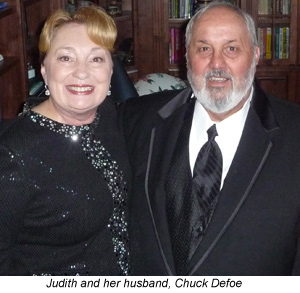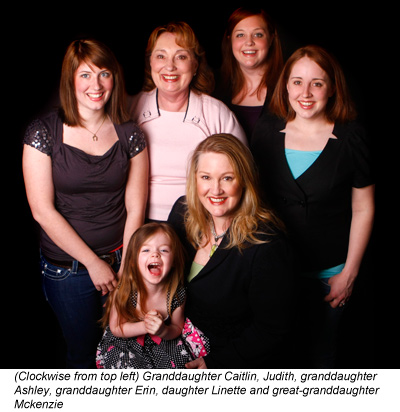- How did you get to be such a doer?
- I come from a heritage of people who have always been involved. My grandmother, who had a huge influence on me, was one of the original Gray Panthers in Oregon. She was a democratic precinct woman who did undercover investigations on the treatment of the elderly in nursing homes. She was amazing and dynamic, a redheaded, brown-eyed, six- foot tall, beautiful woman wearing huge hats. She owned a cabaret in her thirties and was a traveling saleswoman. She lived independently until she was 92. My mother pre-deceased her, so I was responsible for her care up till her death at 95.
- Do you have siblings?
- I’m 67 and the eldest. I had two sisters (one died) and my baby brother, Gary, who recently turned 60. He’s executive vice president of Global Operations for Lamb Weston and he manages over twenty corporations around the world. I helped him through school and was kind of his substitute parent. We’re very close.
- Did you grow up in Oregon?
- I grew up in a small town outside of Portland, called Tualatin, and I live there today.
- Tell us about your background.

-
- I’m self-made. I had some college but basically I’m industry trained. When I was young, my parents told me that if I could type I could work, so I became a 100-word-a-minute typist and I did it accurately. I’m also a natural writer. I first went to work at 17 in the insurance industry and became an insurance underwriter. Then I worked for presidents of engineering and manufacturing corporations. I’ve always said I got my MBA by osmosis. I also received an honorary doctorate from Warner Pacific College in 1993 for my life’s work.
- How did you get involved with the financial business?
- That’s a good story. I went back to college when I was about thirty, studied business and wrote a thesis on women. I discovered that we really were working against ourselves. We wouldn’t move for our jobs, we didn’t study math or the harder sciences, we were encouraged to be teachers, nurses and secretaries and we weren’t looking at the other disciplines. I realized that I didn’t need to look for a job; I needed to look for a career direction.
- Since I could type and manage an office, I was hired by a group of six financial guys who were just starting out. It was 1975 and the financial planning movement was new. Two of the men, bless their hearts, encouraged me to get involved in the industry and, by 1979, I became the first woman Certified Financial Planner in the western United States. So I was mentored. If you combine my work ethic, luck, and my typing skills, I was absolutely blessed to find these fellows, take the opportunity they offered and turn it into a career.
- How lucky.
- Yes, all these brilliant men with advanced degrees were talking in my ear all day long and they coached me. When I was about forty, a vice president of the firm I was with, said, ‘Judith, you’re one of the finest women financial planners in the United States, but no one knows about you. You’ve got to take advantage of the educational retreats run by the Institute of Certified Financial Planners.” I took his recommendation and went to St. John’s University in Minnesota in the middle of a hot, wicked summer in 1980, where I also learned about chiggers (FOF FYI, Chiggers are tiny, six-legged wingless organisms (larvae) that grow up to become a type of mite. They’re found in tall grass and weeds and their bite causes severe itching.)
- Besides the chiggers, you must have loved it.
- I sure did. I met a woman who became the President of the Institute. Later on, I served on the National Board of Directors and was the first founding president of the Educational Foundation for the ICFP. I got to know the industry leaders, the pioneers, and that led to a contract with Simon & Schuster to write JK Lasser’s Personal Financial Planner and Personal Investment Planner, which were out for over five years. I also worked on a personal investment management guide for Random House in the early nineties, the first book to include software.
 Are you married? Children?
Are you married? Children?
- My husband, Chuck, has been my best friend for 35 years and we’ve been married for 20 years. He now owns a tiny sporting goods store in Crescent, OR, where we have a mountain house. It’s called Ken’s Sporting Goods. He’s very involved in the little community. He wants his life to be relevant, to make a difference.
- I have a daughter, Linette, who works with me, and a son, who has an automobile dealership in Idaho. Chuck has a daughter.
- Who inspires you?
- Chuck. He’s excited to get going every morning. If I’m not home, our morning phone call is uplifting. He helps me cope with the world. He isn’t a gushy person but he expresses his joy and is interested in our lives away from him. Our accomplishments make him happy. He adopted Linette right before her 25th birthday and surprised her at Easter.
- Girlfriends are important to me. I have really interesting women in my life and we have a girl’s movie night about once a month. One of us will go to the library and pick out a movie. We watch, we eat, we sit around and talk and it’s girl time.
- Linette and I also have stayed connected to other women financial advisors throughout the United States. We’ll go on retreats with them and spend girlfriend time, sharing what may be stressing us out, physically or emotionally.
- And family. I have seven granddaughters from 19 to 30. And we’re involved in every one of their lives in different ways. We get so much love back and we’re part of their energy.

- Do you have a secret spot you love in Portland?
- Sitting in the rose gardens in Washington Park, on a bench overlooking the city with a view of Mt. Hood. When the roses are in bloom on a summer day and they’re vibrant with color and you’re overlooking the river and the city and looking out at the mountain, there can’t be a better spot in the world.
- What about a favorite restaurant?
- I highly recommend Dan & Louis Oyster Bar, which has been in my family for about five generations. I have a heart link to it, but it has great atmosphere. The walls are covered with memorabilia and I know the stories behind it all.
- What’s your favorite shop?
- We love Allie-Coosh in Dallas. She does incredible custom clothes that just flow. I have an absolutely gorgeous jacket from her in white. It’s very thin, goes down to my knees and is perfect for summer or cruising. Her designs are simple but so flattering.
- Tell us about a favorite book.
- Three Cups of Tea, by Greg Mortenson and David Oliver Relin, is about educating the children in the poorest and wildest parts of Afghanistan and Pakistan so they will be less vulnerable to being recruited by the extremists.
- Do you exercise?
- I had a double mastectomy in 1988, so I treasure every single day. I’m blessed with good skin, good bones and a lot of energy, but when I do work at my desk I sit on my fanny too much. The hardest thing for me is to do the stretching and the movement that I need to do.
- What’s the most important thing you’ve learned about money?
- You need to under live your income because you can’t do much good if you’re broke. Most of us spend in retirement more than five percent of what our money will earn. You want your principal to last, so budget to spend 5 percent of the money you have invested.
- So if you have a million dollars, budget to spend $50,000.
- Doesn’t this depend on what age you retire?
- Many people retire at 60 and think of 25 years in retirement.
Judith McGee has contributed the following articles to faboverfifty.com:
Who Has the Financial Power and Control in Your Relationship?

